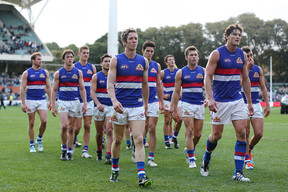 In last week's win against Collingwood - magical and unexpected as it was - we had the illusion, or maybe it's a delusion, that our presence there played a role in the victory. That our increasingly hoarse cheers and manic barracking created some of the hothouse environment which helped to will 'Our' boys across the line. That our act of faith (or insanity as it at first appeared) in getting off our comfy couches and fronting up for what seemed certain defeat meant that we too played our role the sweetness of the win. Wins like that lodge forever in our memories: something to reminisce about and savour as the years go past; the day Kolyniuk ran around Graeme Wright on the mark at the MCG in 1990; the night that Chris Grant swung onto his left boot and put us in front of the bombers in 2000; the night a young Adam Cooney ripped the ball out of the centre and drove us forward time and again in the last quarter of a match against Brisbane in 2005, announcing that a new era was about to begin. They're in the fabric of us, the collective memory shared by the community of Footscray/Western Bulldogs fans - even if they do mysteriously get embellished as time goes by. (I'm quite positive there were only 20 of us Dogs fans in the entire Princes Park stadium on the day of one of our famous, against the odds, victories against Carlton, yet seemingly thousands claim to have seen Bob Murphy, in his first ever game, with an endearing mix of concentration and terror on his 17 year old face, wobble through the winning goal. ) Whatever the outcome of Saturday's match against Port Adelaide - even if it had been another stirring, backs-to-the-wall victory - it would never have stood out in our memories, glowed like a nugget of gold amid the sameness and sometimes even monotony of season after season, match after match. For the simple reason that hardly any of us would have been there in person to share it, side by side among each other riding the tempo of the match, in what we imagine is in togetherness with our players, travelling with them through the rough, as well as the smooth, of individual quarters, games and seasons. In fact, in the 10 minutes preceding last Saturday's match against Port Adelaide, my connection to the Dogs and their efforts, whether great or poor, could not have been more incomplete and distant. Having slipped the Melbourne winter for a short break in Far North Queensland, I'd just discovered, to my chagrin, that the match wasn't broadcast. We're supposed to be worshipping at the altar of the sacred national competition; given all the sacrifices a small club like ours has made in the name of this relentless (and hollow to many of us) expansion, I was miffed to say the least to see V8 racing and thugby were instead scheduled, and I had no hope of seeing the game live. Or even on delay. There was a futile race against time as I switched my efforts into attempting to tune in over the internet. Soon my lack of technological know-how and inability to understand how a game was 'streamed' meant I gave up the ghost and resorted to text message updates from family members back in Melbourne. While better than nothing, it's fair to say that in their haste, these perhaps lacked precision. Did a shrieking message: "BONTI !!!!" mean that our young star had suffered a freak accident, handballed it straight to a Port Adelaide opponent, or taken the hanger of the century? (I later learnt that it was a magnificent goal). 'Oh no, poor Griff!' was also far from enlightening, and I was left bemused by this breathless and incoherent description: "I think roughy is playing with a shoulder again. Grant splattered most." I tried to get slightly more clarity than these excitable but obtuse updates via Twitter. Griff, it turned out, had back spasms and had to be helped up the race. People I've never met, except through cyberspace, began sending me bits of information to complement the erratic family updates. But it was still a patchy, incomplete picture, out of time, out of synch, like bursts of static down a bad phone line with frequent 'I'm going through a tunnel' moments. It reminded me of the days when, not being the tallest of people, I attended matches at Kardinia Park wedged in among the standing room crowds. With limited visibility I had to have large segments of the game relayed to me by others. This, too, was far from reliable. A typical snippet: "Oh my GOD!!! Bubba Smith's down, I reckon Ablett got him behind play and Rohan's about to be stretchered off..he's not moving!" Just as I was prepared to lead a chorus of outraged boos and calls for Ablett to be banned for life or hopefully deported: "Oh, sorry, might have got that wrong. I think he just got a cramp. He's definitely up and moving. Ablett's not even near him, but he's just booted his 10th." As I attempted to establish a 'personal hotspot' to improve my wifi connection and get clearer information on the game's progress, I couldn't help my mind travelling back to a rather different form of wireless connectivity. Namely that which used to boom out from the big teak-veneer combined radio and stereo unit that had pride of place in my grandparents' Housing Commission home in Braybrook. You'd hear the gravelly voices of 'the Captain and the Major', 'Harry Beitzel and Tommy Lahiff', or if you were unlucky, 3UZ and uninteresting horse races with only intermittent score updates on the fate of the Scray (often this was just as well). They were the soundtracks of our Saturday afternoons. While at the age of four I'd graduated to an important milestone and been granted the honour of being allowed to go to footy at the Western Oval, I wasn't permitted to go to the away games which in those simpler days were always and without exception on Saturday afternoons at 2.10 pm. Instead myself and what seemed like dozens of cousins were left to stay with my grandmother, who usually shooed us outside (though we were usually allowed to have Chocolate Royals mid-afternoon). I've written before about my grandmother's far from extensive, but handy enough, footballing knowledge: She was Irish and would listen to the game on the radio, cooking up a storm for when the adults returned home. We’d run inside at what we thought must be half time. ‘How are we going Nanna?’ Her face would darken. ‘ Five goals down.’ Knowing this was insufficient, she would attempt some spite in her lilting brogue. ’The bloomin’ umpires are killing us!’ My grandmother never saw a game in her lifetime. By half time in the Port Adelaide game, even the patched-together picture of the game was unfortunately clear enough. The text messages slowed down, became gloomy. 'It's getting ugly.' 'Wish it was over now.' With no real sense of whether we were just outclassed or playing poorly, but an ominous sense that it was a bit of both, I didn't feel too upset when my overworked phone sputtered out of battery life and I could retreat to the pool. I still haven't seen Bonti's monster goal, or Griff's sad hobble up the race, supported by trainers, or Roughy's struggle to stay out on the field because we simply didn't have anyone else. I didn't share any of the few highs, but I also missed the many lows, and I do mean 'missed' them. I could be disappointed, but philosophical. So many injuries, six day break, tough assignment against the top team of the ladder. Didn't matter all that much, in the scheme of things, I guess. This week, it will be different. In what I'm christening the Inaugural Bulldog Tragician Birthday Blockbuster (yes, it's my 'special day' on Sunday, just as it was last year when we crashed to an ignominious defeat against the Dees - I was there to 'celebrate' of course), I'm hoping to see at least one moment that might be a lasting treasure in the memory bank. I'm looking forward to seeing Honeychurch, Darley and Redpath at last make their debuts. It looks like Jake Stringer will be back with his swagger, and I'd like to see whether Lachie Hunter has regained that cheek and flair as he conjures up a miracle goal. I'll be involved in the performance, hoarse on Monday, back for better or worse on the supporting rollercoaster. I expect I'll spend large portions of the day frustrated, delirious, angry, delighted, amused and bemused, but best of all I'll be there. More reading: Limber up for this ripsnorter of a match when teams 13 and 15 square off, by travelling back to my account of my birthday last year spent (of course) watching the Dogs lose an 'unloseable' match against Melbourne. And I recommend a lovely, funny and poignant tale of choosing the Dogs as your footy team by Neil Anderson on the Footy Almanac: 'Sixty years is a long time in football.'
0 Comments
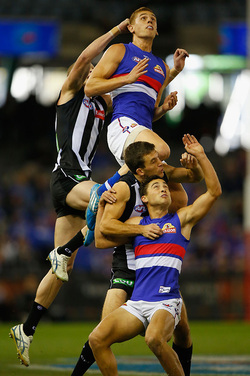 The family text messages to organise our attendance at Sunday's match against the Pies weren't exactly zinging around. 'You going?' 'Umm. We probably should.' 'Yeah. It's important, right? ' 'Even though we'll probably get smashed'. 'There's that, yes.' 'Meet you at the usual fate.' (Ooops, damn autocorrect). 'Usual gate!' Faith and enthusiasm have dwindled among the Bulldog fans. The losses are piling up; the Catastrophe Performance Index has been in meltdown and has seeped into fan morale as well. Our future doesn't seem as bright as we thought just a few months ago, as doubts creep in from all angles. Our 'irrelevance' has become the new, fashionable talking point. Suddenly the whole footy world has a new scapegoat: us and our lack of improvement. Everyone's got an opinion on our lack of a game-plan. Everyone is questioning what's wrong with Ryan Griffen and Will Minson. Everyone's pointing to the apparent lack of progress, making doomsday scenario predictions that we could bottom out still further when some of our stalwarts call it quits. Yes, the team has been grinding it out; effort and commitment haven't been in question (in some ways that makes it harder to cope with). But there's an increasing lack of joy, of flare, dash, zest. Winning ugly is one thing. Losing ugly is another altogether. And our losing form brings another form of ugliness: walking past the race at the end of our disheartening Brisbane loss, I'd felt my face flush with anger and embarrassment at seeing our players trudging off the ground, running the gauntlet of abuse from some of our own fans. There had been outbreaks of tensions and anger erupting during the match between supporters who still clapped and encouraged the team, and those who felt that as fans they had earned the right to ridicule and boo the team at this the most trying of times, and took their venom out at those who saw it differently. There was further demoralisation in the wake of the loss. In one of Bob Murphy's saddest articles he took a gentle but pointed gibe at those fans that delighted in 'taking the players down a peg or two' and reflected on better times: Some of my most treasured time in football has been at the top. Winning big games, winning finals, playing in front of huge crowds when you can actually feel the pride of your own supporters beaming back at you, like the warmth of the springtime sun. His words seemed those of someone who had fallen out of love with the game, or, more chillingly, with our club. And it almost seemed he'd reached a fatalistic acceptance that those good times, when the team is playing well and we as fans bask in that winning afterglow, are beyond reach of this current group. Or at least a group that would still feature a Bob Murphy, with his sidestep, his elegance, his sublime talent. His crazy-brave passion for our club. Which right now is giving him more pain than joy. With all the grim news swirling in the background I really couldn't even muster enthusiasm to pen this blog after our Brisbane loss. I tried a few times (but like Homer Simpson's advice to his kids: when it's all too hard, give up). The sentiments I wanted to expressed seemed old-fashioned, trite and banal, yet they're what I believe. That you don't get to pick and choose when to barrack for your club, disappearing from their orbit in the bad years, only to reappear with suspiciously new scarves in better times. That going along every week in these hard times, even if it's an effort, form a protective fortress and a core of resilience (harden up, you young scallywags, I've been there for at least a dozen 100 point losses!) and will make our triumph one day (- it will happen one day - won't it? -) extra poignant and unbelievably sweet. These are all the reasons why I am trudging up LaTrobe Street on Sunday afternoon towards the stadium and what seems a certain belting against an in-form team. It's what you do, that's all. There are few, oh so few, Dogs fans around. So few that we all keep catching each others' eyes. It feels like we should exchange some sort of grim, stoic, terse, acknowledgement. Laconic and Australian. 'You're here too?' 'Yep.' Nothing else required. Waiting for family members at the 'usual fate', I get talking to an elderly, rheumy-eyed man; he is wearing a Bulldogs beanie. He looks too old to be there on his own; he is hampered by a limp. We make some small talk; the weather, a few mildly jocular observations re Pies fans ( you have to, don't you?), and ticket prices. I want to ask him why he is there, about the things he'd seen. Was he there in 54? Who was the greatest Bulldog he'd seen? What does he think of our current plight? I'm sure he has a story to tell. But I hesitate to ask, and he heads off into the game with a cheery wave. I recognise another Bulldog-supporting couple walking in. They usually sit a few rows in front of us at our home games. We've never spoken, but I've watched their joy when we win, seen them jubilantly waving their scarves and singing the song, shared their quiet resignation when we lose. I feel strangely glad to see them. To know, even though we don't exchange a word, that they're here too. There are four members only of the Tragician Clan today. One brother, one sister, one son. One Tragician. We head towards the nosebleed section, where we are vastly outnumbered by the black and white army. The match quickly unfolds in accordance with our low expectations; yes, it seems, we will be badly outclassed. Our forward line in the first 10 minutes is a scramble of bodies; painstaking work reaps no reward. Three leisurely goals in contrast come effortlessly to the Magpies, one of them from an unattended player waltzing down the ground, bouncing the ball in carefree fashion, taking it away from our congested forward line and players lumbering after him. It would be, undoubtedly, a long afternoon. It's a relief when we finally jag our first goal. And then, surprisingly enough, another. We hail them with over-the-top exuberance; aware that Melbourne only managed three for the whole afternoon against the Pies the week before, we want to get value for money out of each one. Hang on...we've kicked two more. We're deliriously happy to see we're in front at quarter time! In time-honoured 'acceptance of mediocrity' mode, we jump enthusiastically to our feet to give Our Boys a clap. So low have been our expectations that we take a while to recalibrate and get a sense of what's going on as the match progresses. We're not only right in this game; we're winning it, taking it on, playing a quite different and exciting brand of football; the slow hesitant players who featured in the dismal Brisbane match mysteriously transformed into demented, frenzied running machines. Griff, our captain, is playing the inspirational footy we've been hoping for all year, hurling himself into contests, his trademark zip and burst returned. He's showing us, I think, not just how much the criticism has stung, but how much he loves this club. The other much maligned player in the media glare this week, Will Minson, who has been shouldering an insane rucking burden manfully with no support all year, has regained that nasty manic aggression that is so endearing in your own players (and totally reprehensible in others). And the Second Libber...I don't have the words for what he's doing out there. In his dad (the First Libber), you could see the burning will and intensity, or as Martin Flanagan memorably said: In his prime, he was capable of recording a third of his team's tackles and year after year he led the AFL tackling count. Larger players would see this tiny 163-centimetre figure in front of them, back themselves to run over the top of him and find themselves brought crashing ignominiously to the ground. His son is playing one of the best, most complete games I've seen in the red, white and blue. Thirteen clearances, ten tackles. His face is blanker than his dad's, the emotion is more hidden, but his actions tell us that he's inherited his fierce competitive spirit. He's powering around the ground, driving us forward again and again - there's one moment when he simply rips the ball out of his opponents' hands. Around him, a brigade of younger players are growing in confidence and more than ably supporting him. Suddenly they've gelled, and you can see the future that's been brewing in BMac's petri dish: Jackson Macrae with his elusive movement and the brilliant peripheral vision that the elite players have; Liam Jones providing a high leaping forward target (yes, you read that right) and strong counterpoint at our end of the ground for the monster Cloke; Jason Tutt putting together self-belief with his pace and long kicking; Wallis sticking doggedly to his tagging task on Pendlebury; high-leaping Easton Wood refusing to give up a contest. The wily foxes, Murph, Gia and Morris, are gracefully ceding support roles to this new breed, who are now linking up after all those hard fought inside possessions, moving the ball relentlessly forward, instead of all somehow getting in each others' way at the bottom of the pack. At three quarter time we're stunned. The scoreboard says we're six points up. It's a nervous tentative happiness, far from jubilation. Sometimes daring to win is the hardest thing of all, for fans and players alike. It's hard not to retreat into our shells, to be satisfied with a brave effort, to prepare mentally for the last quarter surge from the Pies that must surely be moments away. When we get the first two goals of the last quarter it first occurs to me that we could actually win. Just as I'm grasping this unlikely possibility, Liam Jones, who's been superbly accurate, must have had the same thought; he misses what should have been his fifth goal. The Pies begin an ominous charge. Their uncharacteristically subdued fans begin their famous intimidating roar, rocking the stadium, as their players click smoothly into a higher gear. Suddenly it feels like they've been toying with us, waiting for this moment when the real match will begin and they can flick us away like annoying mosquitoes. In the pressure cooker atmosphere I think of how many times the Pies have played at the MCG in blockbuster matches, with huge crowds, with so much more at stake. They're so much more at home in this screaming cauldron, when the air seems to have vanished, and the fans can barely breathe. The Dogs, surely, are about to crack. Legs look heavy. Our run is gone. The Pies, who know how to win, are steaming home, within a goal with five minutes to go. Here it comes. Our Usual Fate. There's a last lunge of Bulldog defiance, a last fierce flurry of intense contests, and it's us that win them. Jason Tutt has the ball in his hands in front of goal, a set shot that's not especially difficult, yet not that easy for a player who seems always to doubt his place in the side. When he kicks truly there's a tremendous din that makes you forget there's only probably 3000 of us Dogs fans there. A roar of relief, of delight. Of amazement. When the siren goes, our joy knows no bounds. There was something else, after all, that Murph said in his article about strength in hard times. You suddenly find yourselves a tightly wound-together group of human beings who genuinely feel like it's you against the world. We take a photo of the four of us, celebrating wildly, to capture forever the memory of the day that We Were There. I try and catch news of our game on the radio on the trip home, but they're covering the Essendon-Demons match which is still playing out. I'm not at all surprised when I hear that Daniel Cross has contributed to the last passage of play that leads to an inspiring Demons victory (well, all right, I'm quite a BIT surprised that it was apparently a perfectly weighted kick from our much loved helicopter-kicking specialist). It seems fitting that the new bearer of the number four guernsey that Crossy wore with such distinction, Marcus Bontempelli, played a superlative, breakout sixth game, earning a Rising Star nomination. It was Bonti's last quarter run and kick that found Jason Tutt, and won us the match. The footy circle of life turns around again. I get a text from my partner, the Footy Non Believer. 'Why can't the Dogs play like that every week for you!' Only the Believers know the strange but true answer. It wouldn't be as much fun. 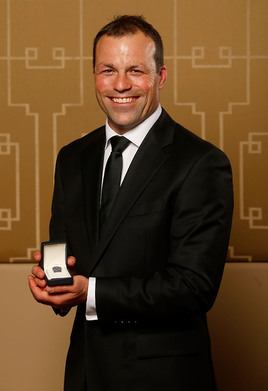 Brad Johnson, our new AFL Hall of Famer, is pretty much my all time favourite Western Bulldogs player. Alongside Chris Grant. And Bob Murphy. And Dale Morris. And Daniel Cross. Well, he's right up there, that's all I'm saying. Three hundred and sixty four times, over 16 years, he ran out for us, doing us proud in the red, white and blue. He grew from an enthusiastic young bloke with a bad haircut and erratic, wonky kicking style, into a dominant, dangerous power forward despite his size. His greatness isn't always recognised, even among our own fans. I don't know why, as to me, alongside great natural talent and one of the best work ethics you could hope to see, he epitomised leadership, integrity and loyalty. And he was such a joy to watch; with his infectious enthusiasm he never seemed to lose a sense of fun, the sheer love of kicking a goal, the star-struck aura of being out there, playing footy, having a great time with his mates. It's still a bit staggering to think that in 2006, Johno finished second in the Coleman medal with 74 goals. He kicked more than 50 in each of the following two seasons. Despite being an elite midfielder for most of his career, he actually played to an even higher standard after his transition to the forward line in his late 20s and early 30s. The fact that he was such a hard match up - combining the gut running and athleticisim of a midfielder with marking prowess and uncanny goal-sense - were big factors in our tilts at the flag in that era. This week, it's been a little bit hard to be upbeat about our club, as our relevance and future have been questioned. The sustained period of success that Brad was part of - and integral to - has passed, and hard times are here again, and we have to learn all over again that a) losing sucks and b) that this too will pass (It's worth remembering that Brad was part of one of our more dismal seasons in 1996, captured in The Year of the Dogs, where we copped some fearsome drubbings and were only saved from a wooden spoon by poor Fitzroy's death throes.) So it feels like a good time take a trip down memory lane and reflect on what I've written before about Brad Johnson. Because if ever a player could remind us of what's important about our club, and reinforce what we can be proud of (while inevitably recalling some of the sadness about our recent missed opportunities that's now hardwired into our DNA) it's Johno: When the then Footscray Football Club drafted a local boy in 1993, he was pictured on TV beaming from ear to ear (actually that was his default facial expression, but we didn’t know it at the time), when his name was called out by the club he had barracked for all his life. Brad was a captain who led us through what was one of our most successful eras, a member of the Bulldogs Team of the Century, a three-time best and fairest winner, and an All-Australian captain. I loved watching his brave marks, his relentless running, and his freakish goal sense (a mid-air soccer goal against Brisbane in 2005 stands out). Playing at centre half forward vs North Melbourne against the revered Glenn Archer and driving him to distraction by being so damn good that Archer punched him in the stomach (later being so embarrassed about this that he rang Brad to apologise). Showing rare anger against John Barnes (a rude gesture was involved after the final siren) because he'd decked him in a match against Essendon in 2000 (come on, we all know the result of that one). Coming back on the field when we were down and out against Sydney in a 2010 final, bandaged up after a severe head gash, and performing heroic feats that dragged us back into a match that seemed lost. It was his second last ever match, though he didn't know it then. There were never, as far as I recall, any dragged out contract negotiations with Brad. Never any whispers that he was holding out for more money, or, sick of the premiership drought, looking to bail out and get a flag elsewhere. There's spine-tingling footage on YouTube (see below) where the surviving 54 premiership players watch highlights of the match at the Yarraville Sun Theatre, alongside members of the 2009 team. Brad sits with Charlie Sutton, the premiership captain, and one of his predecessors in the number six guernsey. Brad asks him how he prepared, what it was like. You feel he's asking as an awestruck fan, trying to drink it all in, not just as a player. Brad commentates on Fox Footy now, having handed on the famous number six to Luke Dalhaus. The smile is just as wide, though the receding hairline reminds us that he is no longer the starry-eyed local kid living out his dream. He still picks the Bulldogs in the Herald-Sun tipping competition on an inordinate number of occasions, defying all logic, reminding us that he's still a fan underneath after all. The last time we saw Brad in our jumper, though, even his famous smile was dimmed. In his last game, another preliminary final loss, he was attempting to console Nathan Eagleton, another retiree, as they sat in the rooms. Brad knew that, unlike Charlie, 'premiership player' would not be added to the list of accolades, no matter how close it seemed that day in the Sun theatre. 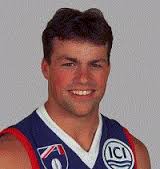 Brad in fact played in five losing preliminary finals. Looking back at them, this week, the ever-upbeat Johno (even Bob Murphy once said: "I can't believe anyone can be that positive all the time!") is quoted as having no regrets. “The first couple I was only young and ‘97 was the one (that got away). In ‘98 we weren’t in it as Adelaide blew us off the park in the first quarter, Andrew McLeod was on fire. “The last three we couldn’t have given any more. As a group and being captain at that time you walked off, while bitterly disappointed that we didn’t win one of those prelims to get through, but you knew that our effort and what we put out there was everything. “We didn’t walk off going, ‘What if?’. Obviously there are always some things you look back at and think if we had of done this different at this time it might have been a different story. “But the one thing you can sit back and never question was what was put out there from the group. It helps lessen the pain in some ways.” Congratulations to Brad Johnson, Hall of Famer, and so nearly premiership captain, for the pride and honour you have brought our club. Here's the video of the 2009 team with the 54 premiership heroes: 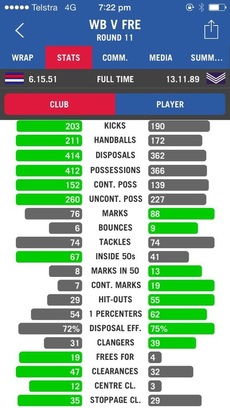 Last week I wrote about the many shades of losing, and the tangled set of emotions that follows in their wake. One of the unique delights in following the Bulldogs is their capacity to endlessly expand this repertoire. Sunday's loss to Freo demonstrated that I'd carelessly overlooked that endearing, but durable, category: A Loss Where You Do Lots of Things Right But Still Lose By Seven Bloody Goals. (I'm looking to trademark it soon). There's a certain consolation in being able to blame a loss on an apparent lack of effort. You can get sanctimoniously riled up at the perceived failure of the team to 'man up' or 'get on him!' (Though in these more complex, less innocent times, a new age supporter might explode with: 'For god's sake, is it too much to ask that we adhere to our structures!') Our loss to Freo, as the depressing, almost unbelievable, statistics above show, was not a loss which neatly fits a 'lack of endeavour' explanation. In fact, the loss might have been less excruciating if there wasn't abundant evidence that our players, who outdid Freo in most measures, were trying (actually, very trying). It's a unique form of suffering to know that so much effort was being expended, so much hard graft was going on. And yet all day the result seemed inevitable, as it has for the last dozen or so times we've faced a Ross Lyon-coached football team. However, here's a well-known fact: 98 per cent of statistics are just made up on the spot. The numbers we saw after the game might not have been out and out inventions, but so much of what we saw as spectators wasn't reflected in the statistical tables. They show, for example, that Fremantle had more 'clangers' than us. I don't know how a 'clanger' is defined, but it appears, if this statistic is to be believed, that 'ceaseless bombing towards seemingly nobody in the forward line' is not included. Nor do the stats reflect our disposal efficiency of 72 per cent (are you kidding me???!!), which was only slightly less than our opponents, rated at 75. I'm suggesting, therefore, the introduction of a 'Catastrophe Performance Index' - or CPI. This should capture all those occasions when the Dogs handballed to the feet of their team-mates, kicked into the man on the mark, or lacked the vision to spot a rare good option. Bonus points would accumulate at moments where, after applauding a heroic effort by Dale Morris or Easton Wood to fling themselves in the path of a Freo attack, you then groan with horror as the next kick is an ugly floater straight back from where it came. Drilled passes to a certain extremely tall ruckman of the purple persuasion would also score highly (in fairness, Sandilands and his fellow giants seemed to all congregate in our forward line. They probably concluded, with justification, that this was no danger zone, but rather a haven in which to merrily feast on our lack of forward talent). This new performance measure (I'm trademarking it too) would provide a more complete, well-rounded,and satisfying picture of Sunday's match. 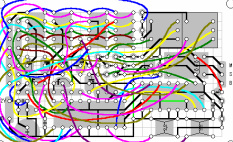 CPI analysis of Sunday's match CPI analysis of Sunday's match The CPI could be rendered in complex diagrams, accompanied by demented whiteboard squiggles such as this early prototype. Handily, it also fulfills the purpose of bamboozling the media and fans alike in one deft manouevre. Coaching personnel could further befuddle us with earnest explanations of how the CPI had an impactful relationship with our Adherence to Structures Ratio, divided by the Quality Forward Entry Matrix, but tripled by the Bulldogs Misfortune Variability Quotient. Alternatively, we could just concentrate on one simple figure that caused all Bulldog hearts to sink when it appeared on the screen at three quarter time. We had gone into the forward line 54 times and scored five goals. I didn't really need to consult the Catastrophe Performance Index to see that this was not a good thing, or to feel the pain and frustration at seeing our repeated toil - our patent desire to win - yield such pitiful rewards. From that point, the last quarter seemed interminable. In happier days, last quarters used to last forever because we were usually in the lead, and I was breathlessly watching the clock and, as a seasoned Bulldogs veteran fan, calculating whether it could be snatched off us in new world-record time. (Yes, I was the person who once announced, with completely mis-placed confidence, 'Melbourne will need to score three goals in less than three minutes to snatch this game, which is impossible,' only to see this exact scenario unfold.). But now, the last quarter was dragging from the sheer boredom of the game, the seeming impossibility of us scoring, and the often unwatchable spectacle of ugly, roiling packs milling together on the field. I found myself drifting off into some of the eccentric reveries that distract me in times like these. Asking the big questions. Why, for example, are small forwards somehow so intrinsically annoying? I waste further, not so valuable, moments, compiling a mental list of the most irritating (this has been triggered, of course, by the presence of Hayden Ballantyne). He would, I'm sure, rate in the All Time Top Twenty but how would he compare against the 'non-giants' of the genre? Steven Milne would, of course, have to go close to patron saint of this esteemed collective. Yet, I mused, Philip Matera, Darren Bewick, Jeff Farmer and Ronnie Burns surely deserved honourable mentions. I was just at the point of an internal debate on where Eddie Betts and Jake King would feature in this illustrious pantheon when I became vaguely aware that a commotion, or at least a minor kerfuffle, was brewing around me. Not, unfortunately, because I'd missed a flurry of scintillating play, a surge of dynamic goals (any goals are dynamic at present), and an unlikely come from behind rally. This was the rumbling, restive discontent of a discontented crowd. All day there'd been an undercurrent - a combination of anger and disappointment stirred up from years of failure, bubbling ominously to the surface in this lacklustre match. Throughout the day most of this had been directed at a player (who I will cunningly disguise by dubbing him Player 'X'). Player 'X' has played less than 20 games for us. A high draft pick, he has not, it's fair to say, lived up to expectations. Maybe due to persistent injury. Maybe because like many high draft picks he simply hasn't delivered on his promise. Maybe he's just become a convenient whipping boy, an outlet or a scapegoat, whose inconsistent progress would not get so much attention at a better-performing club. I honestly don't know if Player X will, or should, play more games than his current handful, whether he's much more advanced or significantly behind what you'd expect at this still early point of his career. (I'm pretty sure his many detractors don't really know either). He's not going to be the next Brad Johnson, that much seems clear, but is this enough reason for him to carry the can for this disappointing game, this gruelling, unfulfilling match? There's been an ugly muttering every time he goes near the ball; some in the crowd seem to actually enjoy his failings, are gleeful when he's tentative or inept, sneer when he kicks out on the full - even though so many of his team-mates are performing similarly. Now, late in the last quarter, I feel dismay as I hear the abuse - from our own fans - swing from Player X towards our coach. As the chorus begins to swell, a few others around us take issue with the dissenters, who begin to rubbish and mock our club and our performance. One of them shoots back self-righteously: 'At least I'm not accepting mediocrity.' Agh, that old chestnut. 'Accepting mediocrity.' I truly hate that phrase. There's a perennial debate in an unsuccessful club like ours - one I've written about before but never really resolved. Is it ok to call our players, our club, our coach, to account - to jeer them if they under-perform just as we applaud (and take credit for) their success? Are the low expectations and resigned mentality of our fans part of a 'culture' problem, feeding into a lack of self-esteem, factors in why we consistently fail? How much should the supporters demand of a club, and do our expectations, low or high, have any impact anyway? Is the team out there playing 'for us'? Is our part of the bargain uncritical, unstinting support, the loyalty we give to a family where even no-hopers can't be abandoned - or are we discerning 'consumers' who can vote with our feet and refuse to 'accept mediocrity'? The siren sounds, with the Bulldogs having added one more goal (from a free five metres out) for the quarter, while bombarding the inside 50 zone a dozen more times. Usually after a loss I'm keen to scurry away, begin the debriefing - and in this case avoid the funereal Freo victory anthem. But I'm reluctant to leave with the ugly mood I see on some fans' faces, the jeers and taunts that are building in anger and bitterness. Brendan McCartney always exits the coaching box just near us. It seems important somehow to stick around and form a sort of invisible human shield. The jury may still be out on whether BMac will bring us the ultimate success. But he deserves, I am convinced, our respect, and an outward display of loyalty and support. Brendan comes out and walks, alone, in the direction of the gathered supporters. His gaze is fixed and wary; he may be unsure whether we are assembled to boo or applaud him. It must be the loneliest walk, that of the besieged coach, facing fans that are angry. Frustrated. Even those that are just heartsore. Weary of it all. He's greeted, though, by a tentative smattering of applause. Others, too, have stayed around, maybe with the same motivation as me, to drown out the naysayers. To my relief I can't hear any abuse. The mood is depressed and flat, but I hear: 'Good on you Macca.' 'All the best Brendan.' 'Next week, boys.' I wish there was something more inspiring I could offer as he walks past me. My words seem inadequate but they are heartfelt. 'Go Dogs.' ************************************************************************************ Read more about 'accepting mediocrity': Cheers and jeers: what makes a fan? Product placement |
About the Bulldog TragicianThe Tragician blog began in 2013 as a way of recording what it is like to barrack for a perennially unsuccessful team - the AFL team, the Western Bulldogs. Categories
All
Archives
August 2023
|
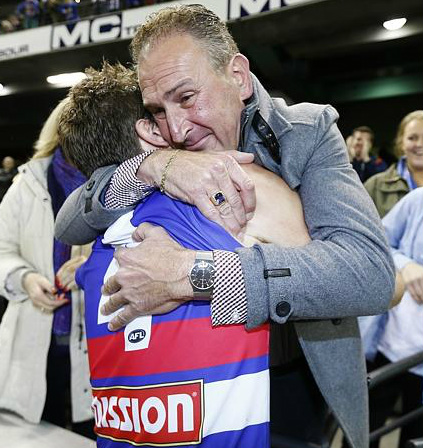
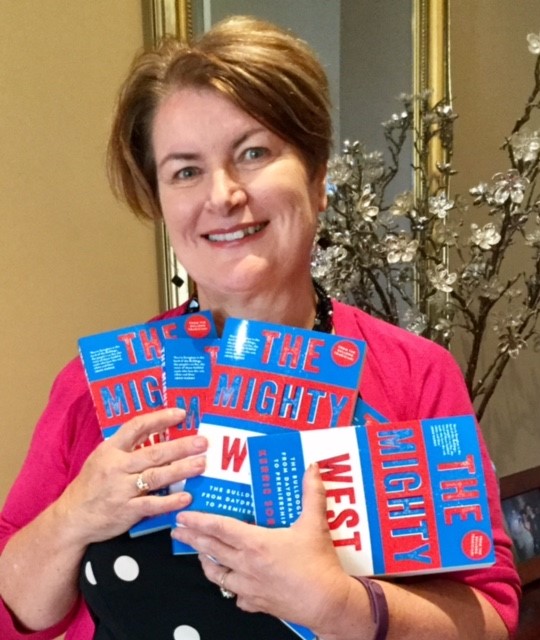
 RSS Feed
RSS Feed